“In general, there is less Israeli Sharon fruit every year”, says Lior Gal of Galilee Export. He is the Sharon Fruit Product Manager at the second largest export company of Fruit and Veg owned by a cooperative of growers. “This is because this fruit cultivation has grown rapidly in Spain for the past few years. They pretty much took over our markets.”
“We cannot compete in Europe with the prices”, he says. Israel only cultivates the Sharon Fruit variety of persimmon where Spain has the Kaki- Persimmon & the Rojo Brilliante which is a bigger variety . “We don’t even try to export Sharon Fruit to Europe until about mid-January. We wait for Spain to slow down and then we slowly and carefully enter the market.”
“Most of the supermarkets do not switch over to the Israeli product until the Spanish season is completely over. Every year, they also last longer. It is becoming increasingly difficult.” This is why, according to Lior, the Sharon Fruit is becoming more of a local Israeli product.
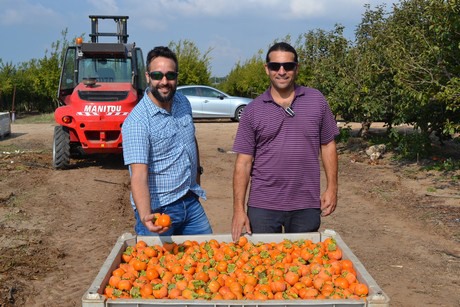
New markets
Lior says they have sent some of these fruits to the Far East. “But, it is very far away, and the Sharon Fruit is a very sensitive product. Transportation takes a long time, and there are always quality issues. I am trying to avoid it.” Israel’s main market for this variety of persimmon is Russia.
“That is the only place where our prices are an advantage”, he says. He added that 50% of Galilee Export’s Sharon Fruit goes to Russia. “The other 50% is mainly sent to the Netherlands and the UK.” In the UK, this fruit is sold mainly in the high-end supermarkets. “They like the Israeli Sharon Fruit.”
Israeli Sharon Fruit had a distinct dark-orange color and is much sweeter than Spanish . “However, along with this comes the fact that its shelf life is shorter”, explains Gal.
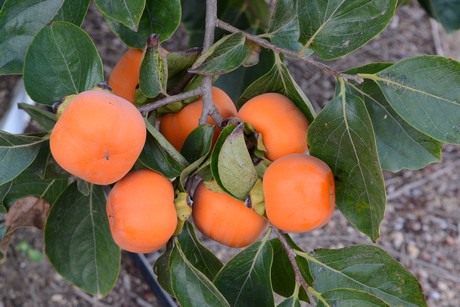
Fewer of these fruits in Israel every year
The acreage used to grow Sharon Fruit in Israel decreases every year. Some of the farmers who grow for the export company have cut down on their Sharon Fruit crops. They have switched to growing avocados and other products. Galilee will be producing about 1 000 tons of Sharon Fruit this season.
“In a normal year we do about 1 500 tons, just for export”, he says. “So we have about 30% less. That is not because there is less fruit being grown. It is because we had terrible heat waves in the summer during the blooming time of the Sharon Fruit. This resulted in a 30% loss.”
Some packing houses are reporting a 50% decrease in volumes. In Valencia in Spain, there was also a 30% loss of persimmons this year. “That is why they want the Israeli fruit early this year; at the beginning of January.”
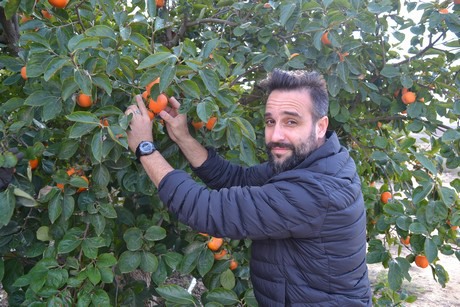
Lior says that 10,15 years ago the Sharon Fruit was a very profitable item in Israel. “Now, it is getting harder every year. However, we manage to get reasonable results with our exports.” He says they do not have any competition from countries such as Turkey because Sharon Fruit is not easy to grow. “The post-harvest process is also complicated and involves accurate ripening process .”
This is the reason we are using only 1 packing house for our Sharon fruit export which is ”Rani Barnes”.
Local market changes fast
This product manager says the local market changes very rapidly because it is so small. At the moment they consume about 13,000 tons of Sharon Fruit. “For example, last season many growers decided to stop exporting their fruit. It was very expensive and complicated. In order to export, you have to keep your produce in cold storage for two to three months”, he explains.
“A lot of growers did not want to do this. They just wanted to send their fruit to the local market and earn whatever they can”, he says. “So, it caused the Israeli persimmon market to crash.”
Galilee Export does not sell directly to supermarkets in Europe. Lior sends the Sharon Fruit to clients all over the Netherlands, Belgium, and Germany. These are sent loose, in two or three kg boxes. These clients then have programmes with supermarkets and specialist greengrocers. He also ships about two containers a year to the US and one or two to Canada. In general, it is not easy to export to these countries, says Lior.
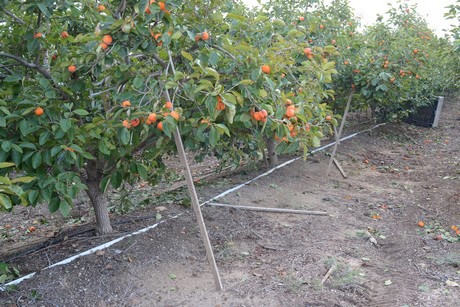
What does the future hold for the Sharon Fruit?
“I am not quite sure where this item will go. I think it will come to a point when there is less. Also, when there is less, you can make a profit. At the moment, Galilee Export is doing to a 1 000 and 1 500 tons. Along with other companies, there is about 6 000 tons of this fruit available for export. In the past, this was closer to 10 000 tons”, he says. “So, the window is short, but there is less fruit, so I think it will become profitable again.”
“I think the growers who are already able to bring good-sized, high-quality fruits get good returns. That is how it has been for the last two years for us. Our growers are happy”, says Lior. “I have managed to keep my volumes.” Although some growers cut back on their acreage, this company added new growers.
Barnes packing house is responsible for storing the growers’ fruit. Prices depend on the quality and sizes of the Sharon Fruit. “As a rule, farmers who have their products stored for longer, get paid more by us.” They get paid a percentage in advance. “Then, at the end of the season, we finalize everything.”
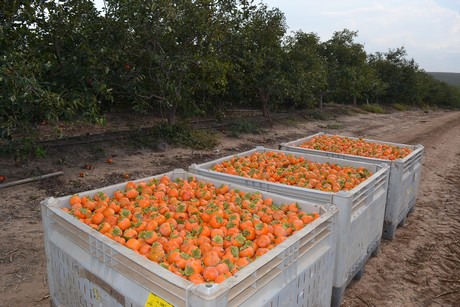
Challenges
Lior says the biggest threat facing Galilee Export’s Sharon Fruit market for the future is Spain. “If the political situation between Europe and Russia is resolved and they are able to go directly to Russia with their fruit, then we have a problem.” He says they have no alternative for Sharon Fruit if the boycott is lifted.
The other major challenges are to keep the Sharon Fruit stored for a longer time, to ensure that the quality is good, and to get good results between January and up to March. “That is the only thing we can do”, he says. “That is our main challenge to keep the fruit stored and shipped in good condition.”
For more information:
Lior Gal
Tel :00972-36539035
Mobile:00972-544859373
E mail : lior.g@galil-export.com
Skype : lior.gal7
www.galilee-export.com
